An Analysis of Ethical Considerations for Accounting Professionals
VerifiedAdded on 2020/05/28
|10
|1917
|74
Report
AI Summary
This report delves into the critical ethical considerations for accounting professionals, emphasizing the importance of integrity, objectivity, confidentiality, professional behavior, and competence. It outlines the core ethical principles that guide accountants in their roles, highlighting the significance of honest advice and unbiased judgment. The report addresses potential ethical dilemmas such as conflicts of interest, confidentiality breaches, and management pressures, providing recommendations to mitigate these challenges. Key recommendations include informing clients about professional ethics and addressing conflicts of interest through transparent disclosure. The report stresses the necessity of adhering to ethical standards to ensure a secure and successful professional career in accounting.
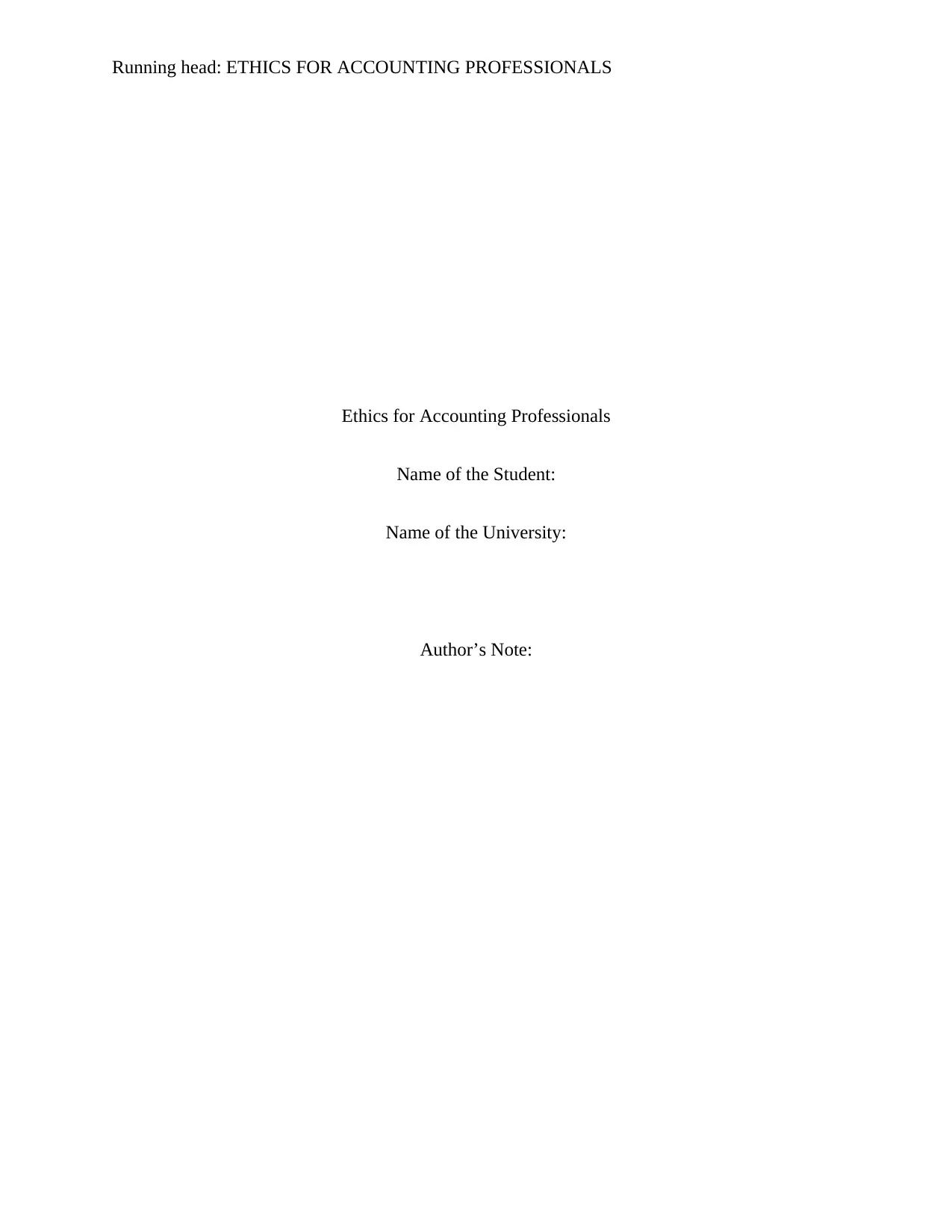
Running head: ETHICS FOR ACCOUNTING PROFESSIONALS
Ethics for Accounting Professionals
Name of the Student:
Name of the University:
Author’s Note:
Ethics for Accounting Professionals
Name of the Student:
Name of the University:
Author’s Note:
Paraphrase This Document
Need a fresh take? Get an instant paraphrase of this document with our AI Paraphraser
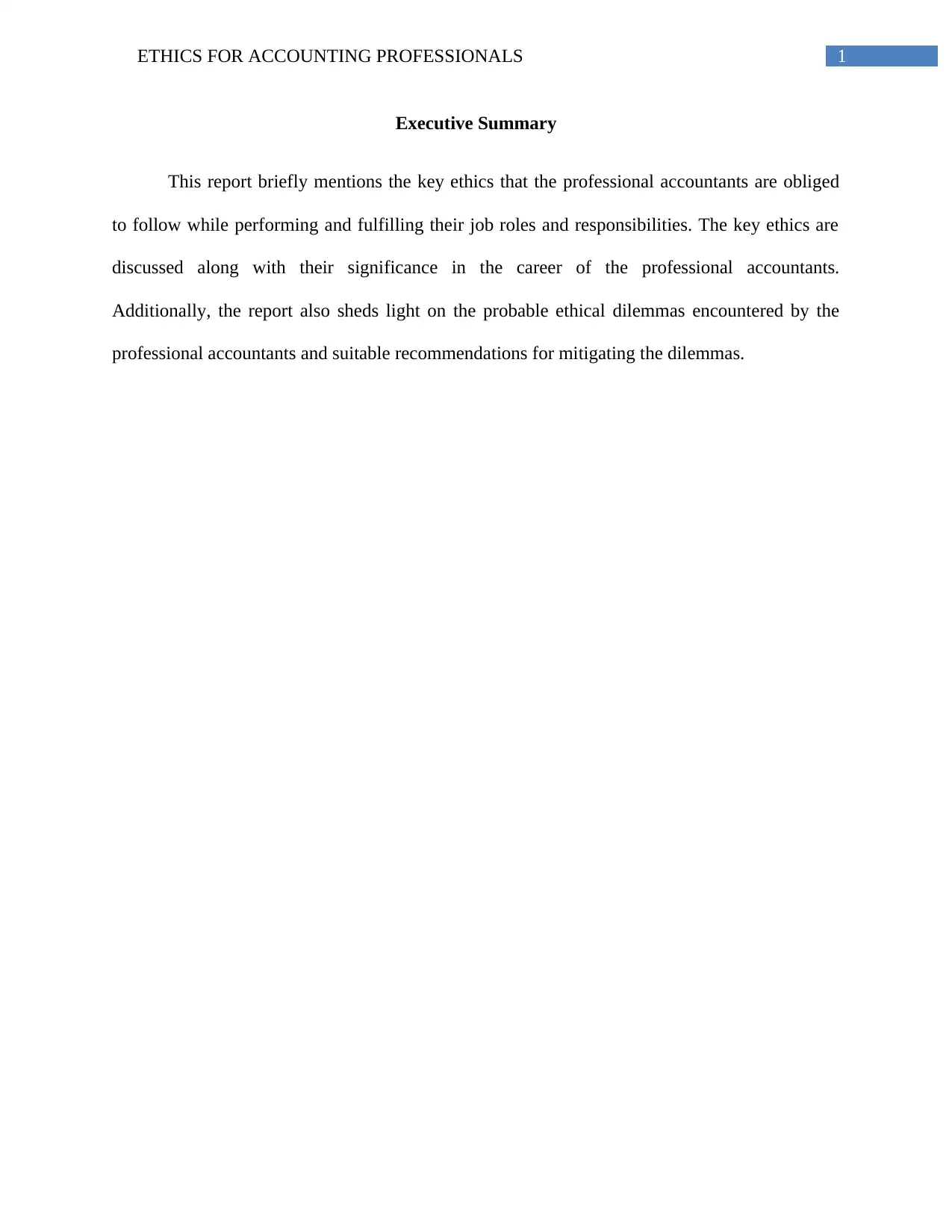
1ETHICS FOR ACCOUNTING PROFESSIONALS
Executive Summary
This report briefly mentions the key ethics that the professional accountants are obliged
to follow while performing and fulfilling their job roles and responsibilities. The key ethics are
discussed along with their significance in the career of the professional accountants.
Additionally, the report also sheds light on the probable ethical dilemmas encountered by the
professional accountants and suitable recommendations for mitigating the dilemmas.
Executive Summary
This report briefly mentions the key ethics that the professional accountants are obliged
to follow while performing and fulfilling their job roles and responsibilities. The key ethics are
discussed along with their significance in the career of the professional accountants.
Additionally, the report also sheds light on the probable ethical dilemmas encountered by the
professional accountants and suitable recommendations for mitigating the dilemmas.
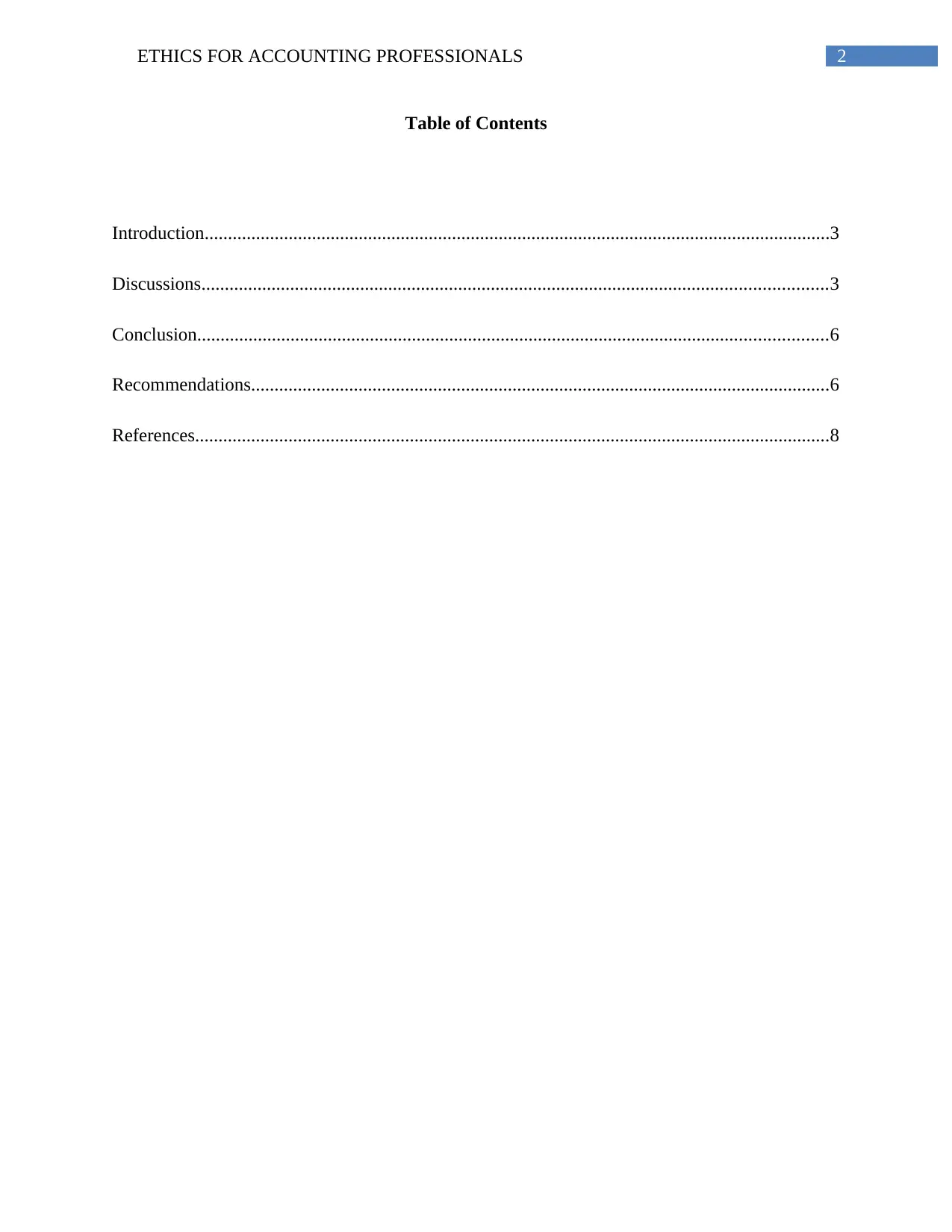
2ETHICS FOR ACCOUNTING PROFESSIONALS
Table of Contents
Introduction......................................................................................................................................3
Discussions......................................................................................................................................3
Conclusion.......................................................................................................................................6
Recommendations............................................................................................................................6
References........................................................................................................................................8
Table of Contents
Introduction......................................................................................................................................3
Discussions......................................................................................................................................3
Conclusion.......................................................................................................................................6
Recommendations............................................................................................................................6
References........................................................................................................................................8
⊘ This is a preview!⊘
Do you want full access?
Subscribe today to unlock all pages.

Trusted by 1+ million students worldwide
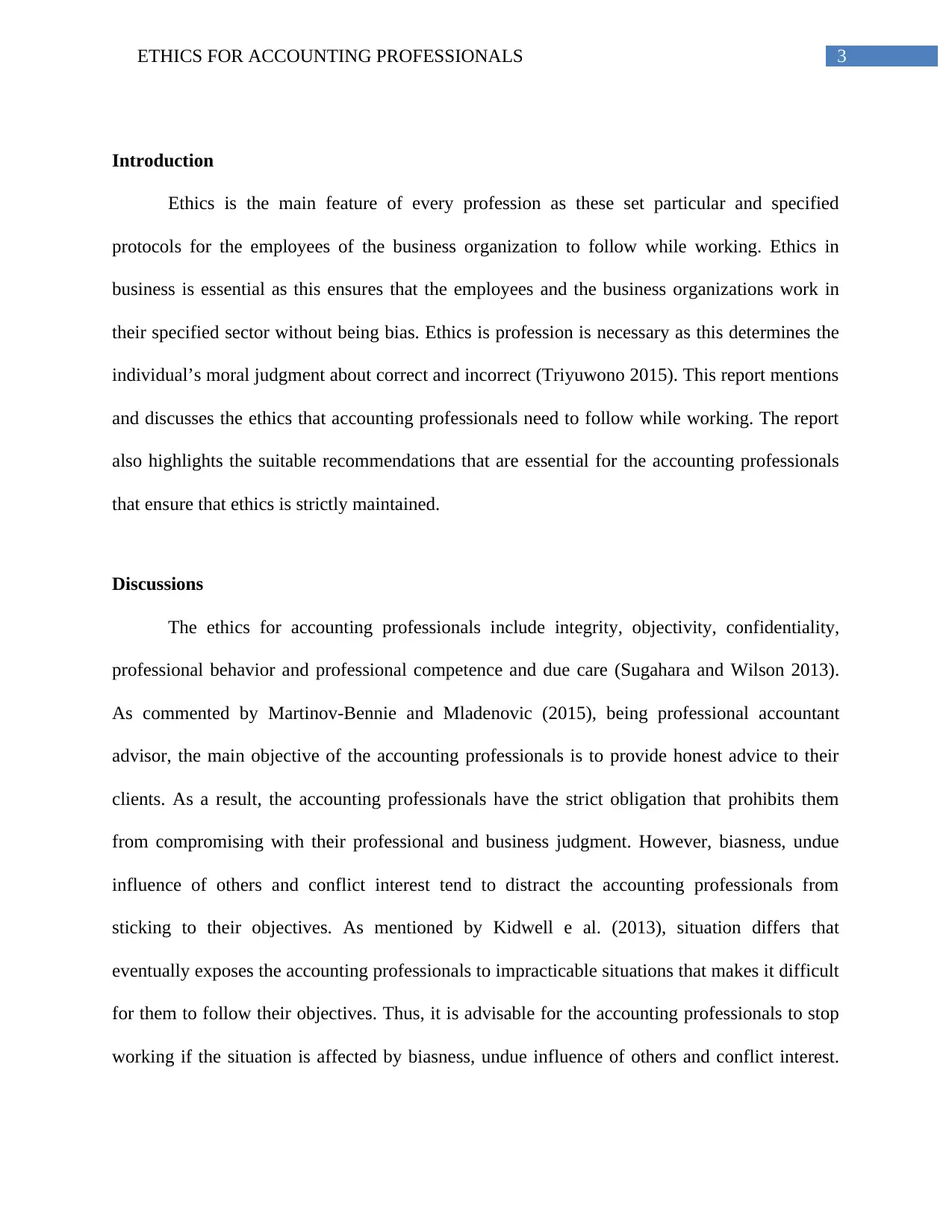
3ETHICS FOR ACCOUNTING PROFESSIONALS
Introduction
Ethics is the main feature of every profession as these set particular and specified
protocols for the employees of the business organization to follow while working. Ethics in
business is essential as this ensures that the employees and the business organizations work in
their specified sector without being bias. Ethics is profession is necessary as this determines the
individual’s moral judgment about correct and incorrect (Triyuwono 2015). This report mentions
and discusses the ethics that accounting professionals need to follow while working. The report
also highlights the suitable recommendations that are essential for the accounting professionals
that ensure that ethics is strictly maintained.
Discussions
The ethics for accounting professionals include integrity, objectivity, confidentiality,
professional behavior and professional competence and due care (Sugahara and Wilson 2013).
As commented by Martinov-Bennie and Mladenovic (2015), being professional accountant
advisor, the main objective of the accounting professionals is to provide honest advice to their
clients. As a result, the accounting professionals have the strict obligation that prohibits them
from compromising with their professional and business judgment. However, biasness, undue
influence of others and conflict interest tend to distract the accounting professionals from
sticking to their objectives. As mentioned by Kidwell e al. (2013), situation differs that
eventually exposes the accounting professionals to impracticable situations that makes it difficult
for them to follow their objectives. Thus, it is advisable for the accounting professionals to stop
working if the situation is affected by biasness, undue influence of others and conflict interest.
Introduction
Ethics is the main feature of every profession as these set particular and specified
protocols for the employees of the business organization to follow while working. Ethics in
business is essential as this ensures that the employees and the business organizations work in
their specified sector without being bias. Ethics is profession is necessary as this determines the
individual’s moral judgment about correct and incorrect (Triyuwono 2015). This report mentions
and discusses the ethics that accounting professionals need to follow while working. The report
also highlights the suitable recommendations that are essential for the accounting professionals
that ensure that ethics is strictly maintained.
Discussions
The ethics for accounting professionals include integrity, objectivity, confidentiality,
professional behavior and professional competence and due care (Sugahara and Wilson 2013).
As commented by Martinov-Bennie and Mladenovic (2015), being professional accountant
advisor, the main objective of the accounting professionals is to provide honest advice to their
clients. As a result, the accounting professionals have the strict obligation that prohibits them
from compromising with their professional and business judgment. However, biasness, undue
influence of others and conflict interest tend to distract the accounting professionals from
sticking to their objectives. As mentioned by Kidwell e al. (2013), situation differs that
eventually exposes the accounting professionals to impracticable situations that makes it difficult
for them to follow their objectives. Thus, it is advisable for the accounting professionals to stop
working if the situation is affected by biasness, undue influence of others and conflict interest.
Paraphrase This Document
Need a fresh take? Get an instant paraphrase of this document with our AI Paraphraser
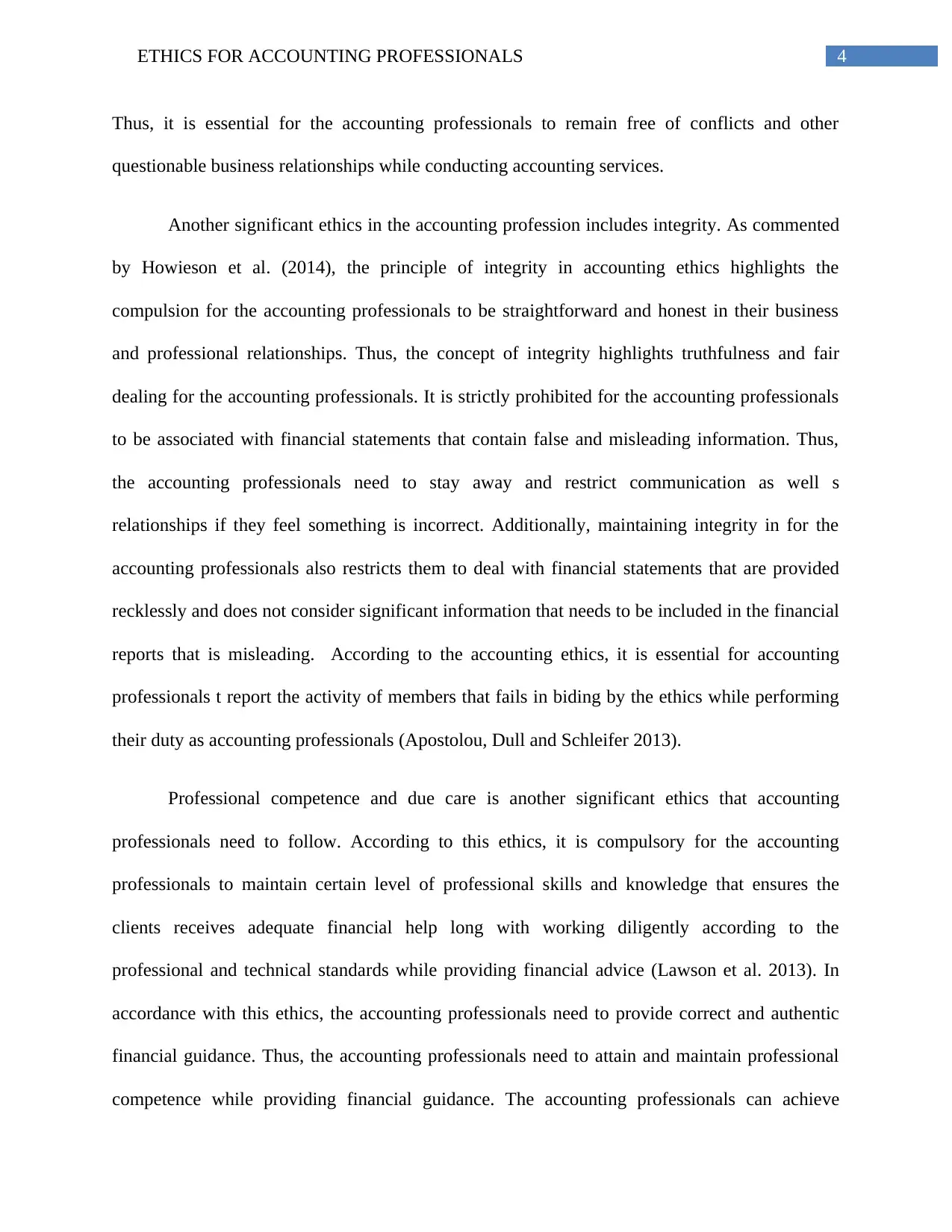
4ETHICS FOR ACCOUNTING PROFESSIONALS
Thus, it is essential for the accounting professionals to remain free of conflicts and other
questionable business relationships while conducting accounting services.
Another significant ethics in the accounting profession includes integrity. As commented
by Howieson et al. (2014), the principle of integrity in accounting ethics highlights the
compulsion for the accounting professionals to be straightforward and honest in their business
and professional relationships. Thus, the concept of integrity highlights truthfulness and fair
dealing for the accounting professionals. It is strictly prohibited for the accounting professionals
to be associated with financial statements that contain false and misleading information. Thus,
the accounting professionals need to stay away and restrict communication as well s
relationships if they feel something is incorrect. Additionally, maintaining integrity in for the
accounting professionals also restricts them to deal with financial statements that are provided
recklessly and does not consider significant information that needs to be included in the financial
reports that is misleading. According to the accounting ethics, it is essential for accounting
professionals t report the activity of members that fails in biding by the ethics while performing
their duty as accounting professionals (Apostolou, Dull and Schleifer 2013).
Professional competence and due care is another significant ethics that accounting
professionals need to follow. According to this ethics, it is compulsory for the accounting
professionals to maintain certain level of professional skills and knowledge that ensures the
clients receives adequate financial help long with working diligently according to the
professional and technical standards while providing financial advice (Lawson et al. 2013). In
accordance with this ethics, the accounting professionals need to provide correct and authentic
financial guidance. Thus, the accounting professionals need to attain and maintain professional
competence while providing financial guidance. The accounting professionals can achieve
Thus, it is essential for the accounting professionals to remain free of conflicts and other
questionable business relationships while conducting accounting services.
Another significant ethics in the accounting profession includes integrity. As commented
by Howieson et al. (2014), the principle of integrity in accounting ethics highlights the
compulsion for the accounting professionals to be straightforward and honest in their business
and professional relationships. Thus, the concept of integrity highlights truthfulness and fair
dealing for the accounting professionals. It is strictly prohibited for the accounting professionals
to be associated with financial statements that contain false and misleading information. Thus,
the accounting professionals need to stay away and restrict communication as well s
relationships if they feel something is incorrect. Additionally, maintaining integrity in for the
accounting professionals also restricts them to deal with financial statements that are provided
recklessly and does not consider significant information that needs to be included in the financial
reports that is misleading. According to the accounting ethics, it is essential for accounting
professionals t report the activity of members that fails in biding by the ethics while performing
their duty as accounting professionals (Apostolou, Dull and Schleifer 2013).
Professional competence and due care is another significant ethics that accounting
professionals need to follow. According to this ethics, it is compulsory for the accounting
professionals to maintain certain level of professional skills and knowledge that ensures the
clients receives adequate financial help long with working diligently according to the
professional and technical standards while providing financial advice (Lawson et al. 2013). In
accordance with this ethics, the accounting professionals need to provide correct and authentic
financial guidance. Thus, the accounting professionals need to attain and maintain professional
competence while providing financial guidance. The accounting professionals can achieve
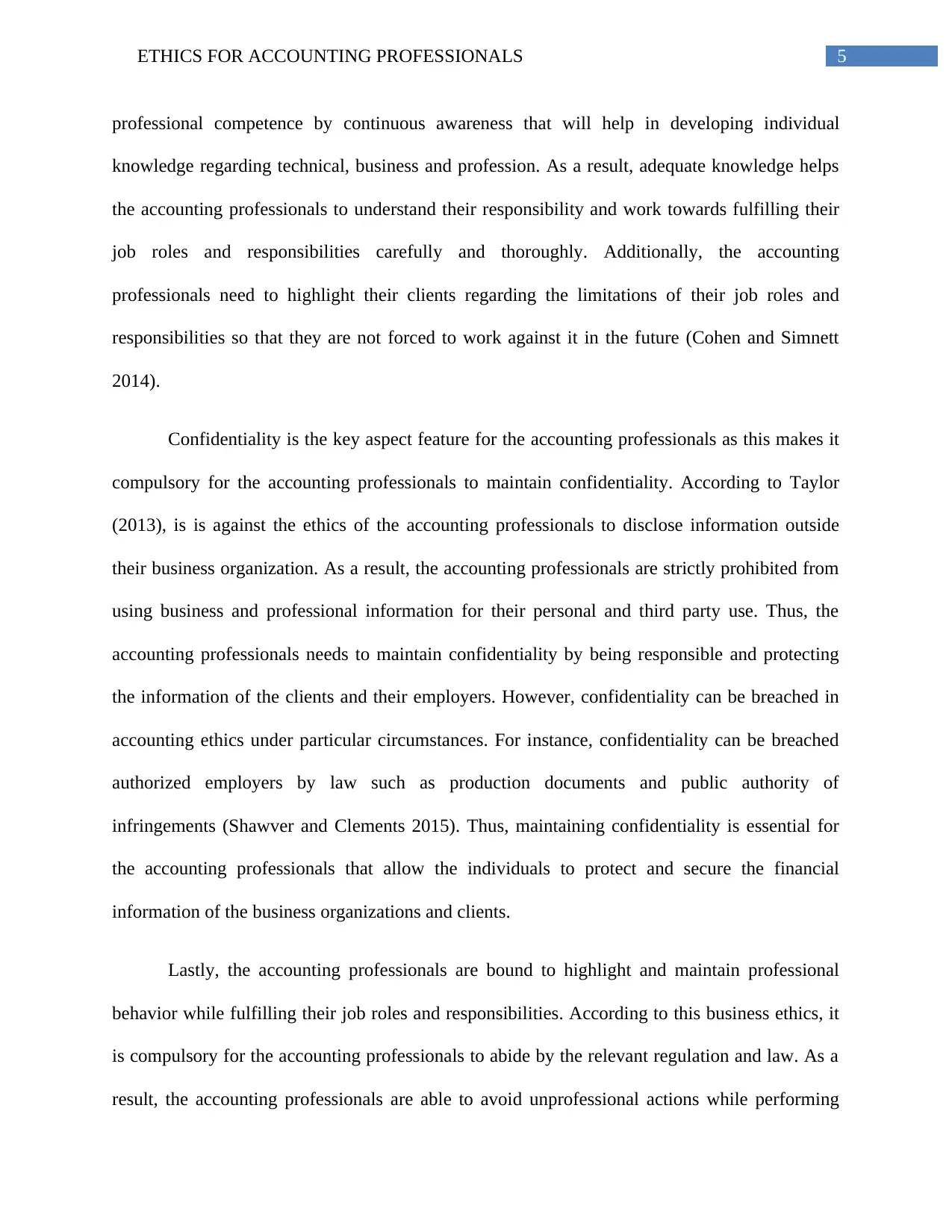
5ETHICS FOR ACCOUNTING PROFESSIONALS
professional competence by continuous awareness that will help in developing individual
knowledge regarding technical, business and profession. As a result, adequate knowledge helps
the accounting professionals to understand their responsibility and work towards fulfilling their
job roles and responsibilities carefully and thoroughly. Additionally, the accounting
professionals need to highlight their clients regarding the limitations of their job roles and
responsibilities so that they are not forced to work against it in the future (Cohen and Simnett
2014).
Confidentiality is the key aspect feature for the accounting professionals as this makes it
compulsory for the accounting professionals to maintain confidentiality. According to Taylor
(2013), is is against the ethics of the accounting professionals to disclose information outside
their business organization. As a result, the accounting professionals are strictly prohibited from
using business and professional information for their personal and third party use. Thus, the
accounting professionals needs to maintain confidentiality by being responsible and protecting
the information of the clients and their employers. However, confidentiality can be breached in
accounting ethics under particular circumstances. For instance, confidentiality can be breached
authorized employers by law such as production documents and public authority of
infringements (Shawver and Clements 2015). Thus, maintaining confidentiality is essential for
the accounting professionals that allow the individuals to protect and secure the financial
information of the business organizations and clients.
Lastly, the accounting professionals are bound to highlight and maintain professional
behavior while fulfilling their job roles and responsibilities. According to this business ethics, it
is compulsory for the accounting professionals to abide by the relevant regulation and law. As a
result, the accounting professionals are able to avoid unprofessional actions while performing
professional competence by continuous awareness that will help in developing individual
knowledge regarding technical, business and profession. As a result, adequate knowledge helps
the accounting professionals to understand their responsibility and work towards fulfilling their
job roles and responsibilities carefully and thoroughly. Additionally, the accounting
professionals need to highlight their clients regarding the limitations of their job roles and
responsibilities so that they are not forced to work against it in the future (Cohen and Simnett
2014).
Confidentiality is the key aspect feature for the accounting professionals as this makes it
compulsory for the accounting professionals to maintain confidentiality. According to Taylor
(2013), is is against the ethics of the accounting professionals to disclose information outside
their business organization. As a result, the accounting professionals are strictly prohibited from
using business and professional information for their personal and third party use. Thus, the
accounting professionals needs to maintain confidentiality by being responsible and protecting
the information of the clients and their employers. However, confidentiality can be breached in
accounting ethics under particular circumstances. For instance, confidentiality can be breached
authorized employers by law such as production documents and public authority of
infringements (Shawver and Clements 2015). Thus, maintaining confidentiality is essential for
the accounting professionals that allow the individuals to protect and secure the financial
information of the business organizations and clients.
Lastly, the accounting professionals are bound to highlight and maintain professional
behavior while fulfilling their job roles and responsibilities. According to this business ethics, it
is compulsory for the accounting professionals to abide by the relevant regulation and law. As a
result, the accounting professionals are able to avoid unprofessional actions while performing
⊘ This is a preview!⊘
Do you want full access?
Subscribe today to unlock all pages.

Trusted by 1+ million students worldwide
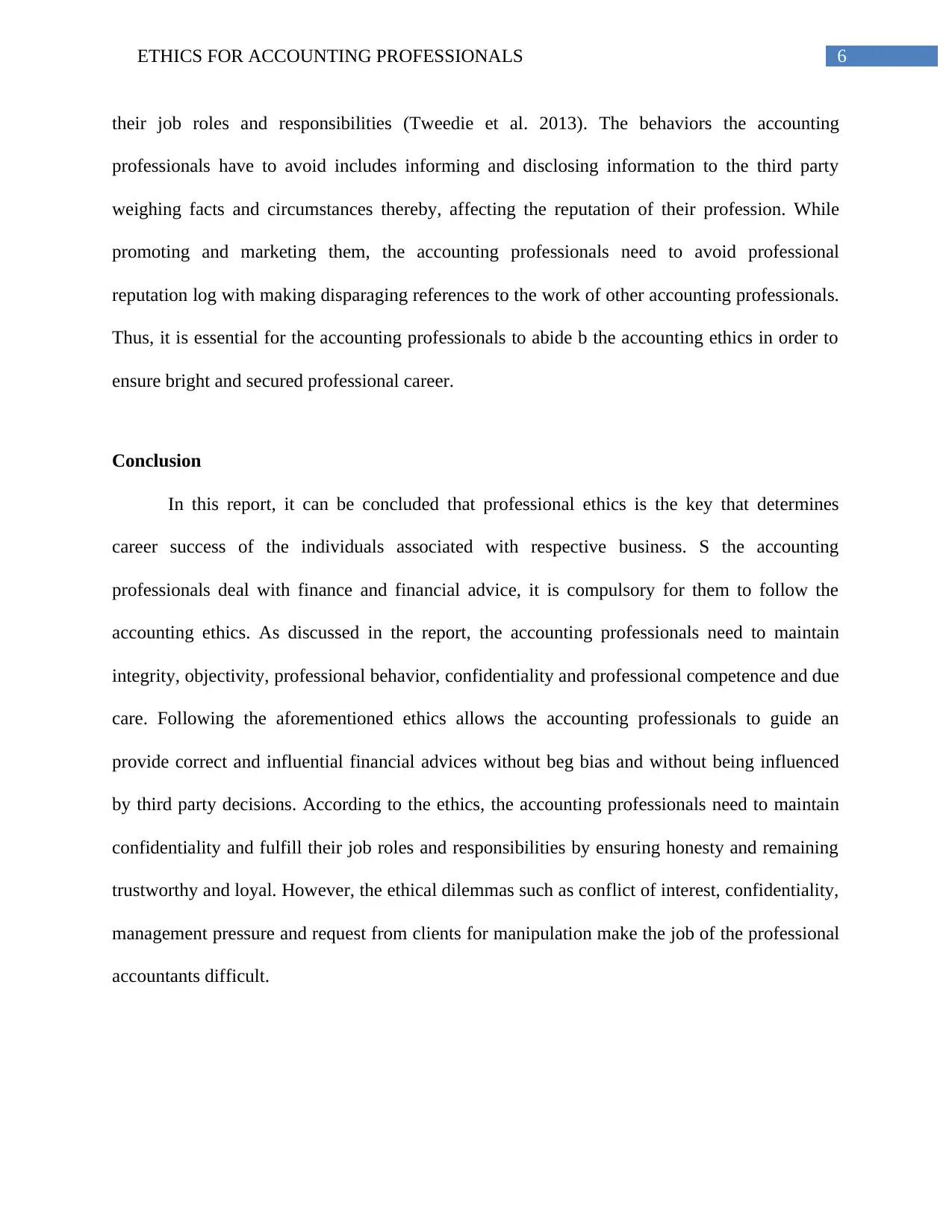
6ETHICS FOR ACCOUNTING PROFESSIONALS
their job roles and responsibilities (Tweedie et al. 2013). The behaviors the accounting
professionals have to avoid includes informing and disclosing information to the third party
weighing facts and circumstances thereby, affecting the reputation of their profession. While
promoting and marketing them, the accounting professionals need to avoid professional
reputation log with making disparaging references to the work of other accounting professionals.
Thus, it is essential for the accounting professionals to abide b the accounting ethics in order to
ensure bright and secured professional career.
Conclusion
In this report, it can be concluded that professional ethics is the key that determines
career success of the individuals associated with respective business. S the accounting
professionals deal with finance and financial advice, it is compulsory for them to follow the
accounting ethics. As discussed in the report, the accounting professionals need to maintain
integrity, objectivity, professional behavior, confidentiality and professional competence and due
care. Following the aforementioned ethics allows the accounting professionals to guide an
provide correct and influential financial advices without beg bias and without being influenced
by third party decisions. According to the ethics, the accounting professionals need to maintain
confidentiality and fulfill their job roles and responsibilities by ensuring honesty and remaining
trustworthy and loyal. However, the ethical dilemmas such as conflict of interest, confidentiality,
management pressure and request from clients for manipulation make the job of the professional
accountants difficult.
their job roles and responsibilities (Tweedie et al. 2013). The behaviors the accounting
professionals have to avoid includes informing and disclosing information to the third party
weighing facts and circumstances thereby, affecting the reputation of their profession. While
promoting and marketing them, the accounting professionals need to avoid professional
reputation log with making disparaging references to the work of other accounting professionals.
Thus, it is essential for the accounting professionals to abide b the accounting ethics in order to
ensure bright and secured professional career.
Conclusion
In this report, it can be concluded that professional ethics is the key that determines
career success of the individuals associated with respective business. S the accounting
professionals deal with finance and financial advice, it is compulsory for them to follow the
accounting ethics. As discussed in the report, the accounting professionals need to maintain
integrity, objectivity, professional behavior, confidentiality and professional competence and due
care. Following the aforementioned ethics allows the accounting professionals to guide an
provide correct and influential financial advices without beg bias and without being influenced
by third party decisions. According to the ethics, the accounting professionals need to maintain
confidentiality and fulfill their job roles and responsibilities by ensuring honesty and remaining
trustworthy and loyal. However, the ethical dilemmas such as conflict of interest, confidentiality,
management pressure and request from clients for manipulation make the job of the professional
accountants difficult.
Paraphrase This Document
Need a fresh take? Get an instant paraphrase of this document with our AI Paraphraser
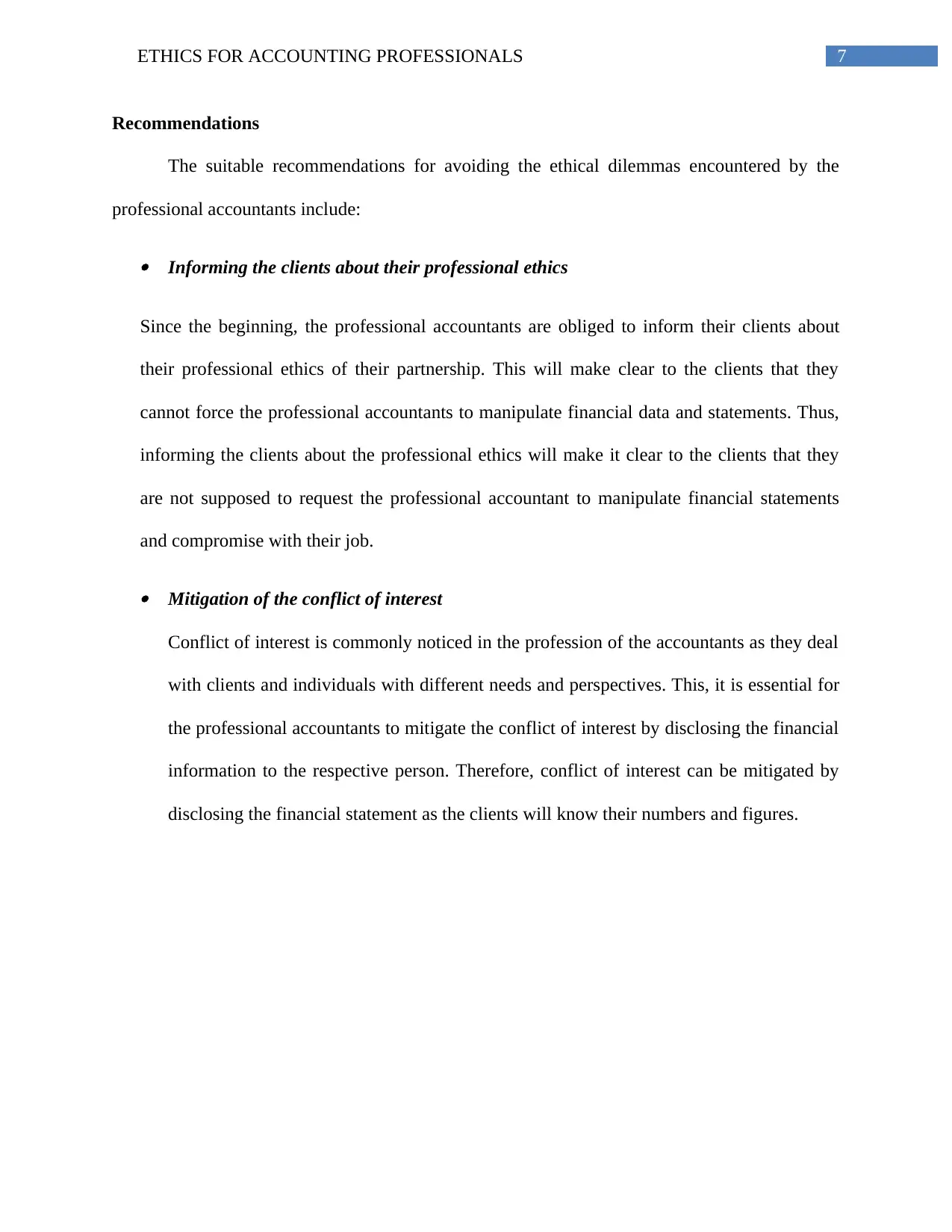
7ETHICS FOR ACCOUNTING PROFESSIONALS
Recommendations
The suitable recommendations for avoiding the ethical dilemmas encountered by the
professional accountants include:
Informing the clients about their professional ethics
Since the beginning, the professional accountants are obliged to inform their clients about
their professional ethics of their partnership. This will make clear to the clients that they
cannot force the professional accountants to manipulate financial data and statements. Thus,
informing the clients about the professional ethics will make it clear to the clients that they
are not supposed to request the professional accountant to manipulate financial statements
and compromise with their job.
Mitigation of the conflict of interest
Conflict of interest is commonly noticed in the profession of the accountants as they deal
with clients and individuals with different needs and perspectives. This, it is essential for
the professional accountants to mitigate the conflict of interest by disclosing the financial
information to the respective person. Therefore, conflict of interest can be mitigated by
disclosing the financial statement as the clients will know their numbers and figures.
Recommendations
The suitable recommendations for avoiding the ethical dilemmas encountered by the
professional accountants include:
Informing the clients about their professional ethics
Since the beginning, the professional accountants are obliged to inform their clients about
their professional ethics of their partnership. This will make clear to the clients that they
cannot force the professional accountants to manipulate financial data and statements. Thus,
informing the clients about the professional ethics will make it clear to the clients that they
are not supposed to request the professional accountant to manipulate financial statements
and compromise with their job.
Mitigation of the conflict of interest
Conflict of interest is commonly noticed in the profession of the accountants as they deal
with clients and individuals with different needs and perspectives. This, it is essential for
the professional accountants to mitigate the conflict of interest by disclosing the financial
information to the respective person. Therefore, conflict of interest can be mitigated by
disclosing the financial statement as the clients will know their numbers and figures.
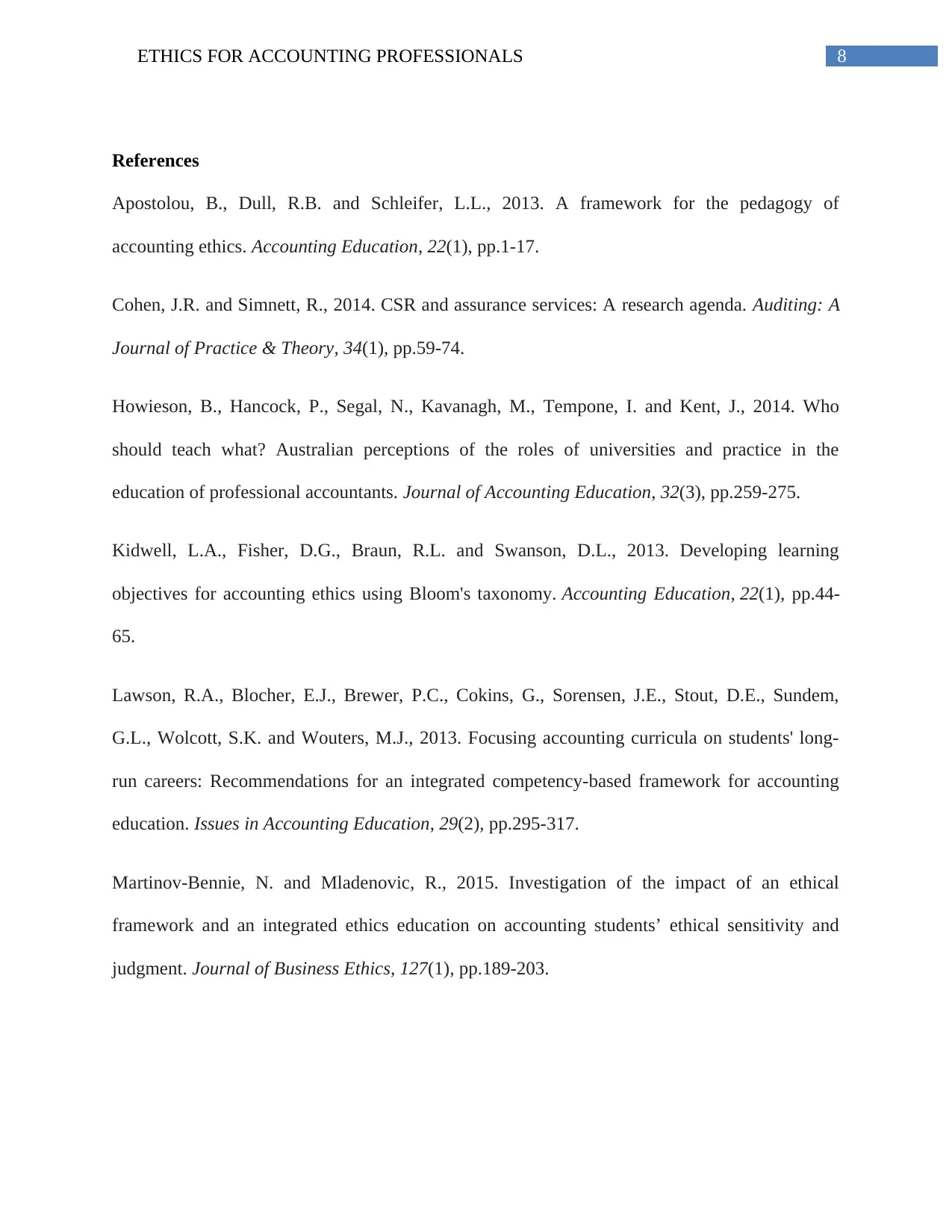
8ETHICS FOR ACCOUNTING PROFESSIONALS
References
Apostolou, B., Dull, R.B. and Schleifer, L.L., 2013. A framework for the pedagogy of
accounting ethics. Accounting Education, 22(1), pp.1-17.
Cohen, J.R. and Simnett, R., 2014. CSR and assurance services: A research agenda. Auditing: A
Journal of Practice & Theory, 34(1), pp.59-74.
Howieson, B., Hancock, P., Segal, N., Kavanagh, M., Tempone, I. and Kent, J., 2014. Who
should teach what? Australian perceptions of the roles of universities and practice in the
education of professional accountants. Journal of Accounting Education, 32(3), pp.259-275.
Kidwell, L.A., Fisher, D.G., Braun, R.L. and Swanson, D.L., 2013. Developing learning
objectives for accounting ethics using Bloom's taxonomy. Accounting Education, 22(1), pp.44-
65.
Lawson, R.A., Blocher, E.J., Brewer, P.C., Cokins, G., Sorensen, J.E., Stout, D.E., Sundem,
G.L., Wolcott, S.K. and Wouters, M.J., 2013. Focusing accounting curricula on students' long-
run careers: Recommendations for an integrated competency-based framework for accounting
education. Issues in Accounting Education, 29(2), pp.295-317.
Martinov-Bennie, N. and Mladenovic, R., 2015. Investigation of the impact of an ethical
framework and an integrated ethics education on accounting students’ ethical sensitivity and
judgment. Journal of Business Ethics, 127(1), pp.189-203.
References
Apostolou, B., Dull, R.B. and Schleifer, L.L., 2013. A framework for the pedagogy of
accounting ethics. Accounting Education, 22(1), pp.1-17.
Cohen, J.R. and Simnett, R., 2014. CSR and assurance services: A research agenda. Auditing: A
Journal of Practice & Theory, 34(1), pp.59-74.
Howieson, B., Hancock, P., Segal, N., Kavanagh, M., Tempone, I. and Kent, J., 2014. Who
should teach what? Australian perceptions of the roles of universities and practice in the
education of professional accountants. Journal of Accounting Education, 32(3), pp.259-275.
Kidwell, L.A., Fisher, D.G., Braun, R.L. and Swanson, D.L., 2013. Developing learning
objectives for accounting ethics using Bloom's taxonomy. Accounting Education, 22(1), pp.44-
65.
Lawson, R.A., Blocher, E.J., Brewer, P.C., Cokins, G., Sorensen, J.E., Stout, D.E., Sundem,
G.L., Wolcott, S.K. and Wouters, M.J., 2013. Focusing accounting curricula on students' long-
run careers: Recommendations for an integrated competency-based framework for accounting
education. Issues in Accounting Education, 29(2), pp.295-317.
Martinov-Bennie, N. and Mladenovic, R., 2015. Investigation of the impact of an ethical
framework and an integrated ethics education on accounting students’ ethical sensitivity and
judgment. Journal of Business Ethics, 127(1), pp.189-203.
⊘ This is a preview!⊘
Do you want full access?
Subscribe today to unlock all pages.

Trusted by 1+ million students worldwide
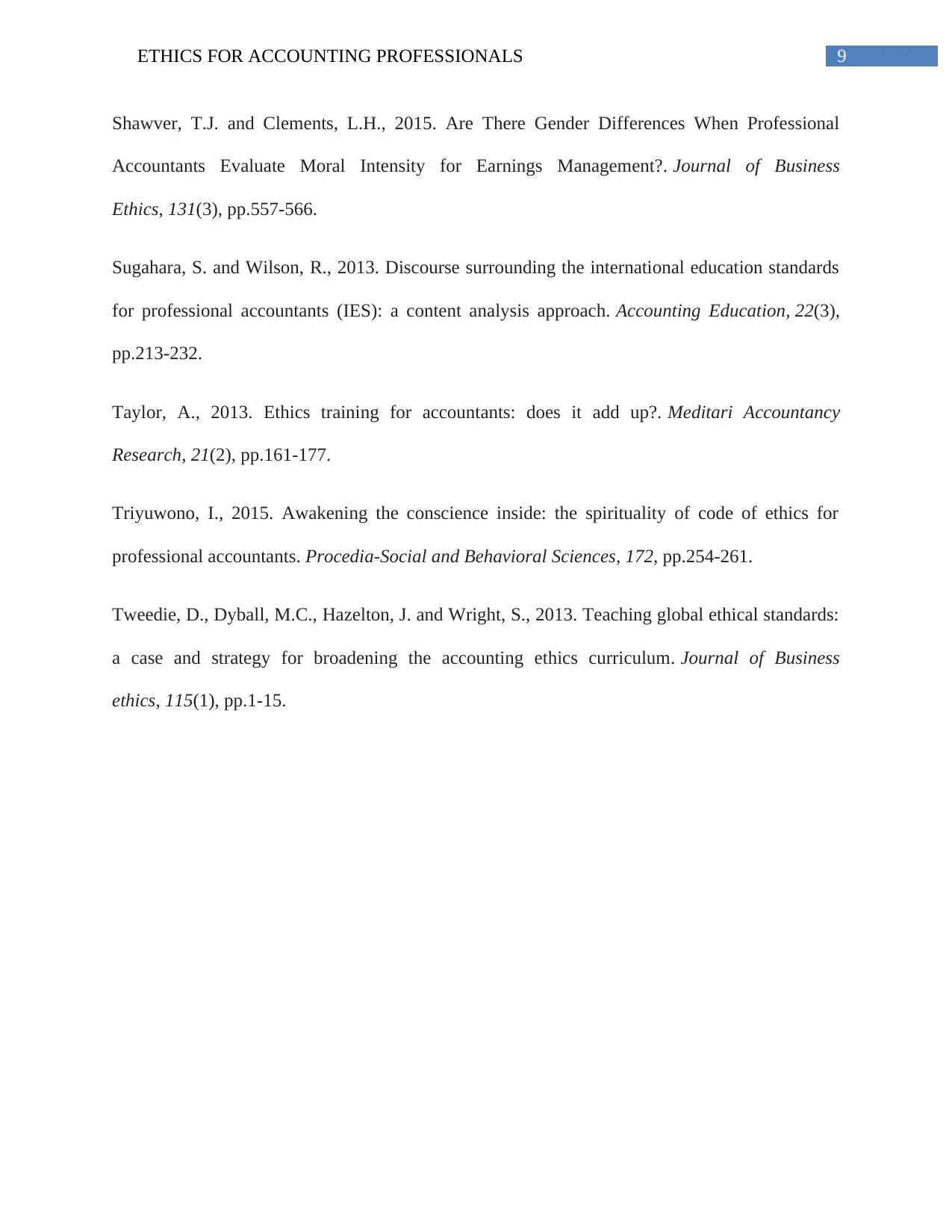
9ETHICS FOR ACCOUNTING PROFESSIONALS
Shawver, T.J. and Clements, L.H., 2015. Are There Gender Differences When Professional
Accountants Evaluate Moral Intensity for Earnings Management?. Journal of Business
Ethics, 131(3), pp.557-566.
Sugahara, S. and Wilson, R., 2013. Discourse surrounding the international education standards
for professional accountants (IES): a content analysis approach. Accounting Education, 22(3),
pp.213-232.
Taylor, A., 2013. Ethics training for accountants: does it add up?. Meditari Accountancy
Research, 21(2), pp.161-177.
Triyuwono, I., 2015. Awakening the conscience inside: the spirituality of code of ethics for
professional accountants. Procedia-Social and Behavioral Sciences, 172, pp.254-261.
Tweedie, D., Dyball, M.C., Hazelton, J. and Wright, S., 2013. Teaching global ethical standards:
a case and strategy for broadening the accounting ethics curriculum. Journal of Business
ethics, 115(1), pp.1-15.
Shawver, T.J. and Clements, L.H., 2015. Are There Gender Differences When Professional
Accountants Evaluate Moral Intensity for Earnings Management?. Journal of Business
Ethics, 131(3), pp.557-566.
Sugahara, S. and Wilson, R., 2013. Discourse surrounding the international education standards
for professional accountants (IES): a content analysis approach. Accounting Education, 22(3),
pp.213-232.
Taylor, A., 2013. Ethics training for accountants: does it add up?. Meditari Accountancy
Research, 21(2), pp.161-177.
Triyuwono, I., 2015. Awakening the conscience inside: the spirituality of code of ethics for
professional accountants. Procedia-Social and Behavioral Sciences, 172, pp.254-261.
Tweedie, D., Dyball, M.C., Hazelton, J. and Wright, S., 2013. Teaching global ethical standards:
a case and strategy for broadening the accounting ethics curriculum. Journal of Business
ethics, 115(1), pp.1-15.
1 out of 10
Related Documents
Your All-in-One AI-Powered Toolkit for Academic Success.
+13062052269
info@desklib.com
Available 24*7 on WhatsApp / Email
![[object Object]](/_next/static/media/star-bottom.7253800d.svg)
Unlock your academic potential
Copyright © 2020–2026 A2Z Services. All Rights Reserved. Developed and managed by ZUCOL.





